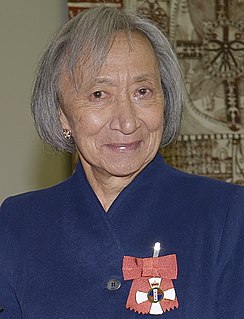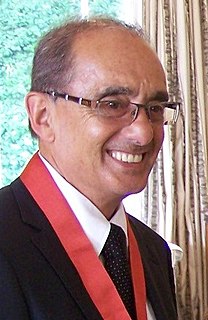Related Research Articles

The Treaty of Waitangi is a treaty first signed on 6 February 1840 by Captain William Hobson RN as consul for the British Crown and Māori chiefs from the North Island of New Zealand. It has become a document of central importance to the history, to the political constitution of the state, and to the national mythos of New Zealand, and has played a major role in framing the political relations between New Zealand's government and the Māori population, especially from the late 20th century.

Dame Silvia Rose Cartwright is a New Zealand jurist who served as the 18th Governor-General of New Zealand, from 2001 to 2006. She was the second woman to hold the office, after Dame Catherine Tizard.

Dame Georgina Manunui te Heuheu is a New Zealand Māori politician. She was a Member of Parliament (MP) from the New Zealand National Party List, and a Cabinet Minister in the New Zealand Government.

William Kenneth Hastings was New Zealand's tenth Chief Censor. He held the position from October 1999 to July 2010. He was Chairperson of the Immigration and Protection Tribunal from July 2010 until February 2013, and is currently a District Court Judge. He was the chair of the Broadcasting Standards Authority from October 2018 until August 2021. He was sworn in as the tenth Judge of the Court Martial of New Zealand on 20 July 2021. On 9 August 2021, Hastings was sworn in as Chief Justice of the Republic of Kiribati.

The constitution of New Zealand is the sum of laws and principles that determine the political governance of New Zealand. Unlike many other nations, New Zealand has no single constitutional document. It is an uncodified constitution, sometimes referred to as an "unwritten constitution", although the New Zealand constitution is in fact an amalgamation of written and unwritten sources. The Constitution Act 1986 has a central role, alongside a collection of other statutes, orders in Council, letters patent, decisions of the courts, principles of the Treaty of Waitangi, and unwritten traditions and conventions. There is no technical difference between ordinary statutes and law considered "constitutional law". In most cases the New Zealand Parliament can perform "constitutional reform" simply by passing acts of Parliament, and thus has the power to change or abolish elements of the constitution. There are some exceptions to this though – the Electoral Act 1993 requires certain provisions can only be amended following a referendum.

Mai Chen is a New Zealand and Harvard educated lawyer with a professional and specialist focus in constitutional and administrative law, Waitangi tribunal and courts, human rights, white collar fraud and regulatory defence, judicial review, regulatory issues, education law, and public policy and law reform. Chen is the Managing Partner of Chen Palmer Public and Employment Law Specialists, board director of BNZ bank and an adjunct professor at the University of Auckland School of Law. Having served previously in the University's Business School. Chen is also the Chair of New Zealand Asian Leaders, SUPERdiverse WOMEN and the Superdiversity Institute for Law, Policy and Business. She is married to Dr John Sinclair and the two have one son.

Dame Frances Helen Wilde is a New Zealand politician, and former Wellington Labour member of parliament, Minister of Tourism and Mayor of Wellington. She was the first woman to serve as Mayor of Wellington. She was chairperson of the Greater Wellington Regional Council from 2007 until 2015, and since 2019 she has chaired the board of the Museum of New Zealand Te Papa Tongarewa.

Dame Claudia Josepha Orange is a New Zealand historian best known for her 1987 book The Treaty of Waitangi, which won 'Book of the Year' at the Goodman Fielder Wattie Book Award in 1988.
The law of New Zealand uses the English common law system, inherited from being a part of the British Empire.

Dame Margaret Clara Bazley is a New Zealand public servant. She began her career as a psychiatric nurse and rose through the ranks to senior leadership positions at psychiatric hospitals and district health boards. In 1978 she became the Director of Nursing at the Department of Health, the chief nursing position in New Zealand and at that time the most senior position in the public service held by a woman, and in 1984 became the first female State Services Commissioner. She subsequently held top positions at the Department of Transport and the Department of Social Welfare.

Sir Edward Taihakurei Durie Was the first Māori appointed as a Judge of a New Zealand Court. He is of Rangitāne, Ngāti Kauwhata and Ngāti Raukawa descent; Mason Durie (1889–

Sir "Sidney" Hirini Moko Haerewa Mead is a New Zealand anthropologist, historian, artist, teacher, writer and prominent Māori leader. Initially training as a teacher and artist, Mead taught in many schools in the East Coast and Bay of Plenty regions, and later served as principal of several schools. After earning his PhD in 1968, he taught anthropology in several universities abroad. He returned to New Zealand in 1977 and established the first Māori studies department in the country. Mead later became a prominent Māori advocate and leader, acting in negotiations on behalf of several tribes and sitting on numerous advisory boards. He has also written extensively on Māori culture. He is currently the chair of the council of Te Whare Wānanga o Awanuiārangi.

Sir William Te Rangiua "Pou" Temara is a New Zealand Māori academic. He is professor of Te Reo, Tikanga and Philosophy at Waikato University and a cultural authority on whaikōrero (oratory), whakapapa (genealogy) and karakia. Prior to working at Waikato, he taught at Victoria University of Wellington and Te Whare Wānanga o Awanuiārangi.

Dame Patricia Lee Reddy is a New Zealand lawyer and businesswoman who served as the 21st governor-general of New Zealand from 2016 to 2021.
Susy Rebecca Frankel is a New Zealand law academic, and as of 2019 is a full professor at the Victoria University of Wellington.
Erihana Rupene Ryan is a New Zealand Māori psychiatrist.
Satiu Simativa Perese is a Samoan judge. He has served as the Chief Justice of Samoa since 12 June 2020.

Sir Peter John Trapski is a New Zealand jurist. He served as chief District Court judge between 1985 and 1989, and was a member of the Waitangi Tribunal from 1989 until 1993.
Elizabeth Welch Orr was a New Zealand lecturer and a previous Chancellor of Victoria University of Wellington. Orr was also a trade union leader and advocate for pay equity.
Heather Angela Ballara was a New Zealand historian who specialised in Māori history. She was appointed a member of the Waitangi Tribunal in 2004. After a short break, she was reappointed to the role in 2015.
References
- ↑ Morris, Joanne R. (1 May 1993). "Balancing or juggling our private and public lives?". Victoria University of Wellington Law Review. 2: 49–57. Retrieved 17 June 2020.
- ↑ Allen, Michael (1 June 2013). "An interview with Joanne Morris". Manutukutuku (Online). 65: 4–5. Retrieved 17 June 2020.
- 1 2 3 "New Zealand's Women in Power: Where are they now?". Stuff. 8 January 2020. Retrieved 17 June 2020.
- 1 2 "New Chair for the Broadcasting Standards Authority". www.scoop.co.nz. Scoop News. October 2003. Retrieved 17 June 2020.
- ↑ "No. 53154". The London Gazette (2nd supplement). 31 December 1992. p. 30.